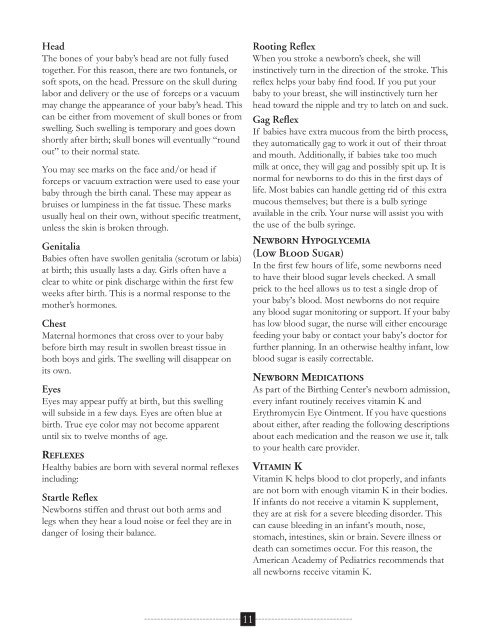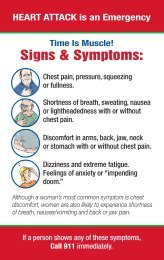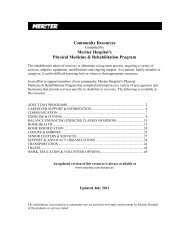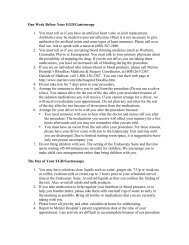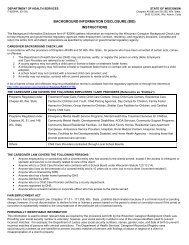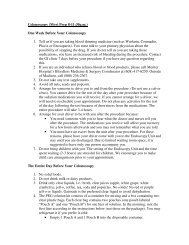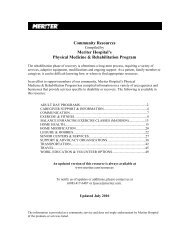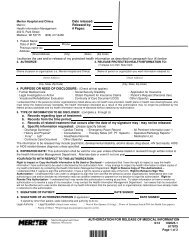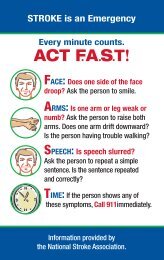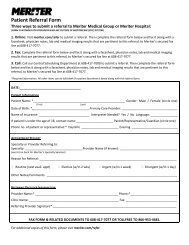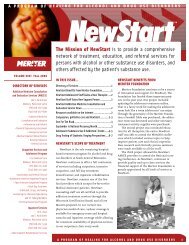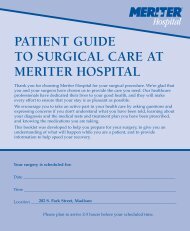A Guide To Your New Family's First Weeks - Meriter Health Services
A Guide To Your New Family's First Weeks - Meriter Health Services
A Guide To Your New Family's First Weeks - Meriter Health Services
Create successful ePaper yourself
Turn your PDF publications into a flip-book with our unique Google optimized e-Paper software.
Head<br />
The bones of your baby’s head are not fully fused<br />
together. For this reason, there are two fontanels, or<br />
soft spots, on the head. Pressure on the skull during<br />
labor and delivery or the use of forceps or a vacuum<br />
may change the appearance of your baby’s head. This<br />
can be either from movement of skull bones or from<br />
swelling. Such swelling is temporary and goes down<br />
shortly after birth; skull bones will eventually “round<br />
out” to their normal state.<br />
You may see marks on the face and/or head if<br />
forceps or vacuum extraction were used to ease your<br />
baby through the birth canal. These may appear as<br />
bruises or lumpiness in the fat tissue. These marks<br />
usually heal on their own, without specific treatment,<br />
unless the skin is broken through.<br />
Genitalia<br />
Babies often have swollen genitalia (scrotum or labia)<br />
at birth; this usually lasts a day. Girls often have a<br />
clear to white or pink discharge within the first few<br />
weeks after birth. This is a normal response to the<br />
mother’s hormones.<br />
Chest<br />
Maternal hormones that cross over to your baby<br />
before birth may result in swollen breast tissue in<br />
both boys and girls. The swelling will disappear on<br />
its own.<br />
Eyes<br />
Eyes may appear puffy at birth, but this swelling<br />
will subside in a few days. Eyes are often blue at<br />
birth. True eye color may not become apparent<br />
until six to twelve months of age.<br />
Reflexes<br />
<strong>Health</strong>y babies are born with several normal reflexes<br />
including:<br />
Startle Reflex<br />
<strong>New</strong>borns stiffen and thrust out both arms and<br />
legs when they hear a loud noise or feel they are in<br />
danger of losing their balance.<br />
Rooting Reflex<br />
When you stroke a newborn’s cheek, she will<br />
instinctively turn in the direction of the stroke. This<br />
reflex helps your baby find food. If you put your<br />
baby to your breast, she will instinctively turn her<br />
head toward the nipple and try to latch on and suck.<br />
Gag Reflex<br />
If babies have extra mucous from the birth process,<br />
they automatically gag to work it out of their throat<br />
and mouth. Additionally, if babies take too much<br />
milk at once, they will gag and possibly spit up. It is<br />
normal for newborns to do this in the first days of<br />
life. Most babies can handle getting rid of this extra<br />
mucous themselves; but there is a bulb syringe<br />
available in the crib. <strong>Your</strong> nurse will assist you with<br />
the use of the bulb syringe.<br />
<strong>New</strong>born Hypoglycemia<br />
(Low Blood Sugar)<br />
In the first few hours of life, some newborns need<br />
to have their blood sugar levels checked. A small<br />
prick to the heel allows us to test a single drop of<br />
your baby’s blood. Most newborns do not require<br />
any blood sugar monitoring or support. If your baby<br />
has low blood sugar, the nurse will either encourage<br />
feeding your baby or contact your baby’s doctor for<br />
further planning. In an otherwise healthy infant, low<br />
blood sugar is easily correctable.<br />
<strong>New</strong>born Medications<br />
As part of the Birthing Center’s newborn admission,<br />
every infant routinely receives vitamin K and<br />
Erythromycin Eye Ointment. If you have questions<br />
about either, after reading the following descriptions<br />
about each medication and the reason we use it, talk<br />
to your health care provider.<br />
Vitamin K<br />
Vitamin K helps blood to clot properly, and infants<br />
are not born with enough vitamin K in their bodies.<br />
If infants do not receive a vitamin K supplement,<br />
they are at risk for a severe bleeding disorder. This<br />
can cause bleeding in an infant’s mouth, nose,<br />
stomach, intestines, skin or brain. Severe illness or<br />
death can sometimes occur. For this reason, the<br />
American Academy of Pediatrics recommends that<br />
all newborns receive vitamin K.<br />
11


